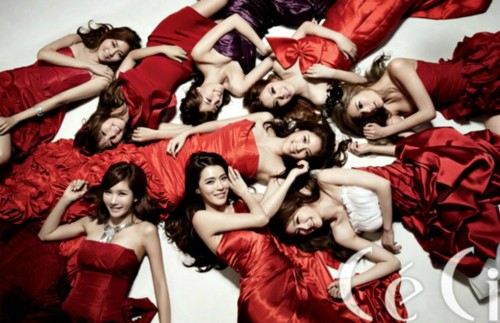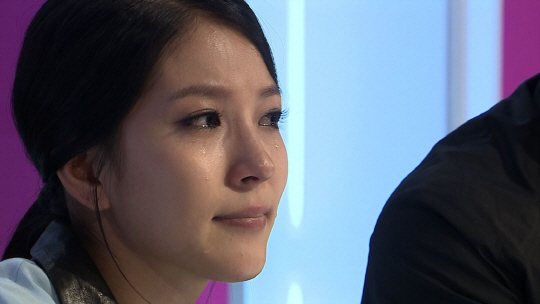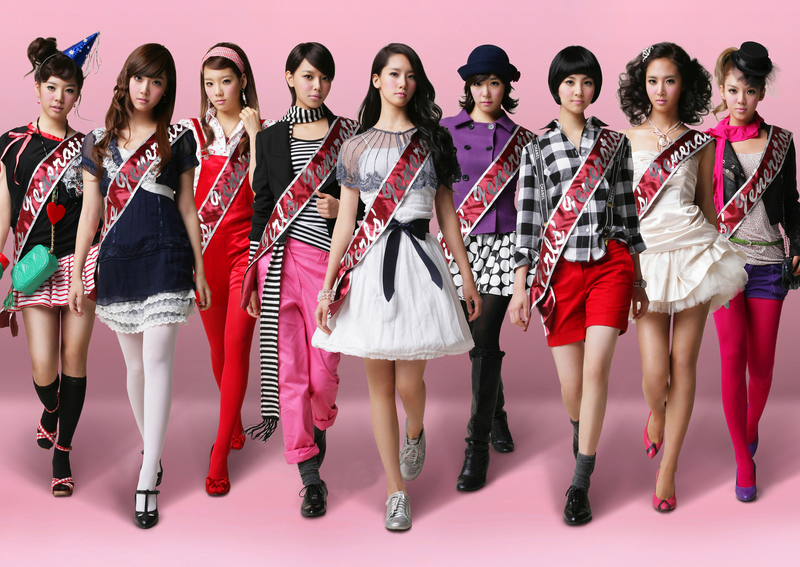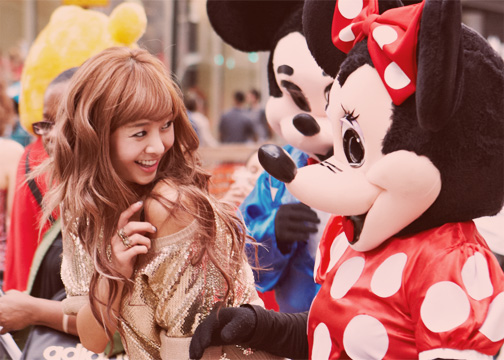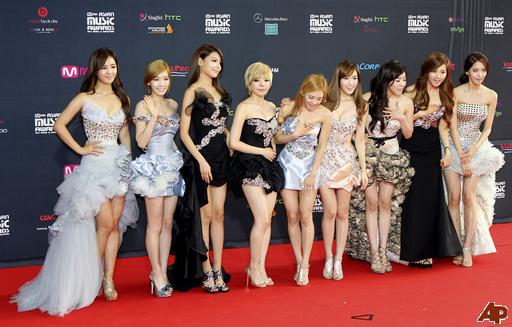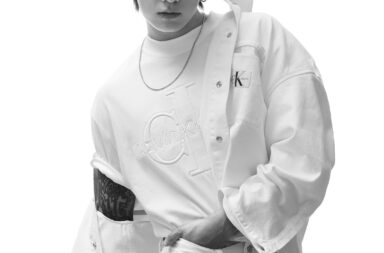Every week here on Seoulbeats, I never fail to be impressed by the things our readers have to say in response to our articles. Some of y’all write freakin’ essays! Maybe you should look into writing for us… hint hint nudge nudge. Although there were a lot of great comments — this week, we will showcase not only comments but also the insightful conversations that you guys had in the comment sections!
VeiledHeart on After School: You’re Doing it Wrong:
My feelings for After School reminds me of U-KISS. It’s like they’re almost there…but not quite. Every single, imo, is just missing that something that keeps you hooked. I liked Ah, but that was forever ago. Bang! was ok, but that’s it. They need some type of major spark to make it pop for them.
AND adding more and more group members isn’t it. It’s just more people for me to NOT care about. I don’t know their names and have no interest in learning them (I’m looking at you too, T-ara). I don’t understand why companies think that this is a good idea. It’d be different if you gave the new girls lines, dance breaks, ANYTHING, but they’re always just in the background making up the numbers. It just seems like more people you have to split your paycheck with.
Conversation on The Complications of BoA Representing Sm Entertainment (warning: long):
Kpopboi:
Although I agree with your sentiments, I am astounded that you can so strongly link sexism to the current construction that is ‘K-pop’. Your article exudes an air that is almost spiteful that men basically run the industry in Korea.. which is fair enough but definitely does not take into account the cultural context of the country. Korea’s social fabric is built differently to the West – and a key aspect of that is the traditional structure of the male and female in all aspects of life – work, family, business, love, respect etc. Its built on centuries of Confucian tradition and law which does – in modern Western terms – emanate what can be deemed as ‘class-ism’ of sex. i.e. the whole notion of the man being the leader and breadwinner, the lady being the bearer of children and the house etc. So to simply define the K-pop industry as being ‘sexist’ – on modern Western terms – is opaque at best.
Let’s keep in mind that Korea is still a very socially conservative country by our standards, and any advances for women should be seen as a big step forward. Which leads me to my next point – Korea is advancing social-culturally at a phenomenal speed. It’s gone from being a stagnant military outpost for the US, to a contributing world power – all foundations for social change… it is a certain inevitability that women will continue to grow in influence in Korean society. If anything, there is now a rise in female influence in Korea – for example – Park Geun-hye is considered the most influential politician in Korea, is a powerbroker and a potential 2012 president – and she’s a woman. Ohh.. and let’s not forget who’s the largest K-pop export in the world – that’s right, your 9 angels ^__~
I guess you best summed it up with your last paragraph. It will INDEED take a great deal of time and effort to make up years of sexism BUT its happening right before your eyes. And INDEED women in Korea are starting to not settle for the bare minimum. It’s a great time for Korea to advance in this respect, as the world’s eyes are beginning to focus more on the little peninsula country. Women rejoice lol.
Saylor:
I’m a little confused by your sexism argument. I don’t see how the Confucian tradition of family differs from Christian values or really religious values of the family as the central unit with the father as the head and the mother submissive. It’s patriarchal like any other religion in this world. This is where sexism stems from in the West religious tradition. Isn’t this class-ism of sex is just sexism?
Kpopboi:
Hi, funnily enough I was actually waiting for someone to present this argument to me, as I had not covered it in my original comment (for fear of it being too long).. so, thanks for that. Now bare in mind I will be focusing solely on your raised point of tradition & culture – not so much K-pop… so for everyone else, this might seem a bit out-of-place but I assure you its highly relevant.
Here’s the thing – There’s actually a huge difference. Sorry to say, but you cannot compare Confucianism with Western traditions in that respect. Put simply, 1. Both cultural traditions are inherently different from each other and 2. Both cultural traditions have diverted so far from each other in modern times that there is little inter-relevance anymore – thus, your viewpoint is sincere but unsubstantiated. Confucianism is built on the relative structures of society and how they relate and harmonize with each other to create a ‘just’ society. Thus, by this foundation, females have their own set of laws that complemented the laws of men. On the other hand, Western traditions stretching before Christianity was defined by what we now call ‘common law’ – laws set for ‘MANkind’ by men. In this respect females were actually not part of this law – which sadly rendered them ‘not people’. And even in the post-French-revolution period, women were only just starting to feature in it – only they were still underneath men. Therefore, they are already essentially two different things…
Which leads to the next point. Your argument would hold true if both cultural traditions were still active today – just as they were in the 1600s – on equal terms. But they aren’t. Confucianism is still rife in Eastern society and hierarchy is still a massive aspect of Korea – not to mention how socially conservative it still is. BUT in the West, look how liberal and equal both sexes live in harmony free from any extremes (in most cases). Western ‘tradition’ has been so watered down, it no longer holds any weight compared to the rigidity of the East. And this branches from not just sexism but also to sexuality, freedom of speech, censorship et. al. The amazing thing was, for the West, most of these traditional barriers were actually broken only in past century.
And… I would go deeper into the whole Christian values debate but that’s also highly irrelevant considering that South Korea is one of the largest hubs for the Christian faith per capita in the world. So it all really boils down to Eastern vs Western values of man and woman – which is what I’ve focused on. Feel free to query me if you’re still confused.. because I can be sometimes lol. Everyone else, just think of this as a history lesson *sigh*.
Saylor:
I disagree. Yes, Confucian tradition and Christian traditions are different, but that doesn’t mean similarities don’t exist. Confucian tradition and Christianity do have comparable ideas. At the center of Confucian tradition is the relationship between the father and the son. At the center of the Christian tradition rests the relationship between Jesus and his father God (yeah the holy ghost is there, but that’s to include everyone else in it). Both traditions are patriarchal. Confucian tradition however is a secular tradition (Confucius was alive in the time of the warring states period in China, thus explaining the need for it to be secular) and Christianity is a spiritual, religious tradition. Both values for these traditions were created in part to establish a structured society where the power of the king or emperor was substantiated. And both traditions differentiated between the role of the man and the role of the woman. The role of the woman was severely limited in both traditions, basically to the home as dutiful wives and mothers. The majority of things Confucius preached in regards to society was aimed at men, he wasn’t referring to women. In both cases woman can be thought of as at the bottom of society.
What I was confused about is the sexism aspect. You argue that “Korean society is built on centuries of Confucian tradition and law which does – in modern Western terms – emanate what can be deemed as ‘class-ism’ of sex. i.e. the whole notion of the man being the leader and breadwinner, the lady being the bearer of children and the house etc. So to simply define the K-pop industry as being ‘sexist’ – on modern Western terms – is opaque at best”. This argument needs a little clarification. Are you arguing that Korean society is not sexist because it stems from a different tradition, or that you can’t apply the term sexism because it stems from a different tradition and sexism is a “modern Western term”? Particularly in relation to Subi‘s article (because even though Subi is one of my favorites as Seoulbeats, this article makes no sense to me or what she’s trying to accomplish).
If it’s the latter, then that creates a problem. Because then you can’t label Korean society as homophobic either in “modern Western terms” or racist or other ists that are bad (…). You’re absolutely right we have to take the differences into account so we can see where these ideas stem from, that is true. But that’s what I’m confused about. I’m not sure what you’re trying to say there, other than the fact that Eastern society and Western societies do originate from different traditions.
And it is sexist. There are many women in Korea that cannot get jobs simply because they are women. And many Korean women (and Japanese women in fact) have fears that they will be fired if they ever get pregnant (which in many ways explains the low birthrates of both countries). Sexism means to discriminate based on a person’s sex. Thus, there are men that won’t hire women based on their sex, believing they should stay in the home as wives and mothers or something else together entirely. Beliefs that can stem from their cultural tradition or religious tradition. That is true in the East and the West. Even countries like Iraq have women in power. The United States has women in power, but they are a small minority which is problematic because as progressive as the US seems to be why isn’t there a larger group of women in politics or math or science, even arts?
I think this is the jist of what Subi wanted to say. Really an encouragement to not be satisfied with BoA as just an idol that was told by her company to come and be a judge. Be happy, but not satisfied. I personally think it’s interesting that SM sent BoA, instead of their actual CEO. I’m not sure what they are trying to accomplish with that.
…This is a long ass comment. Sorry. My confusion on your comment turned into an essay. I think I need to sleep better.
Conversation on SNSD: A Doll’s House:
Michael Park:
A doll is the perfect embodiment of what Korea wants from female idols. In a society so heavily influenced by Confucian ideals and male dominance, dolls represent the submissive role women hold in the society. They’re pretty to look at, beautifully fragile and sit quietly when need to. It’s not just Korea, but this long-held ideal of ‘beauty’ is held through East Asia and throughout history as well. Femininity and womanly fragility are the key markers of a beautiful woman.
Dolls are also exactly what idols are – marketable ‘products’ that people can take ownership of. Not physically, but mentally. That’s why fans are so attached to their idols… they are ‘theirs’.
Of course what’s most interesting about the K-pop scene, and well the Korean entertainment industry in general, is that there is a duality in their role. On the one hand, we like to think that the idols, especially female idols, are pretty dainty dolls. On the other, they are usually portrayed as fierce, individual women. It’s ironic that these ‘idols’ that everyone can take ownership of, also hold so much power in their ability to influence others. Example: Idols can even bypass normal laws (ahem, GD) or conventional social moral codes (ahem, JYJ).
SNSD are especially interesting as they are now seen as representatives of Korea abroad, and held with high respect. Yet there is still and always will be the question of how much individual power do these girls actually hold in both their public and private lives, when the backdrop of the Korean entertainment industry is still very much male-dominated.
Guest:
GD had so little marijuana in his blood that they couldn’t prosecute him and anyone else would have been given the same leeway. The prosecutor specifically mentioned that this type of suspended sentence is one that they use all the time, especially with students, which GD also is.
I agree with the rest of your comment.
Conversation on Is K-pop Too Perfect?:
hippocampus123:
I don’t know about perfect, but the K-pop industry reminds me of Disney…
regina_filange:
Thank goodness someone thinks this also, but I would expand it to most teen sensations. The way Idol popularity overseas is a lot like how JB and all the Disney stars are loved outside of the West, the way they must maintain an innocent, flawless image, the way they are marketed to death before, during, and after their debut as a singer, the CONTRACTS, the way they are trained by professionals into what they do and appreciated for it even if they began as just a cute, spunky, albeit talentless kid, the double standards (If Rebecca Black was a hot teen and had a better video, she’d be all over the fucking place, the way an female ulzzang who can’t sing can become a big hit )…..
K-pop doesn’t represent artists who make good, popular music, or interesting people who explode because people like who they are, the way the pop industry is in America. They represent well trained idols, with manufactured images and forced attitudes, and that only parallels with Disney stars and teen sensations.
LaurenLCD on The Dilution of K-pop:
The majority (if not all) of SM artists’ songs are remakes (either of demos or official songs). SM’s “writers” and “composers” are basically translators now. SM hasn’t made anything original since BoA was signed to the label (probably before then too). Remakes have their purpose, I admit. They make an otherwise irrelevant (whether due to poor sales, or passage of enough time where people forget it exists) tune memorable if done right. But alas, that’s why the Big 3’s artists are called (for the majority) idols. No one’s making their own music anymore, so yes, K-pop is losing whatever made it a bit distinct from J-pop, C-pop, and American pop. In the end due to history, they’ll never be very distinct outside of the Trot (but even that came from the Foxtrot and Enka) genre.
That said, I think a lot of us gravitated towards K-pop (or Asian pop in general), because of the nostalgic value. For the young adults here who were born in the early 90s/late 80s, we were the demographic of boy bands, girl groups, and pop/R&B princesses. We grew up with that sugar coated artificiality as well as the real “artists” who wrote and had a hand in production of their work. K-pop is like our little time capsule. Sure, mainstream K-pop is 10 years behind as far as what’s dominating the market (here, it’s solo artists followed by bands and groups are sort of at the bottom of the barrel), but it sounds modern enough to not be a complete 180 to what we’re used to and hey, even the dumbest lyrics (outside of bad Engrish) can be ignored if you’re not fluent in the target language and don’t take it upon yourself to do a google search. In our own countries, we don’t have the luxury of tuning out the idiocy without concentrated effort.
Melody29 on 2011 MAMAs Fashion: Who Dazzled And Who Fizzled:
The members of SNSD who had dresses showing their cleavage looked so tacky. The image of pushed up boobs and then their faces that look like teenagers is quite disconcerting. It’s like they’re high school students trying to be all sexy and hot at the Prom, but end up looking the opposite. Jessica‘s boobs were almost to her chin! It didn’t look naturally sexy, but “forced”.
They’re very pretty young ladies and some of them have great personal style, but it seems their stylist has no idea how to dress them individually to play on their personality and style. So we get these contrived outfits that some of the girls look uncomfortable wearing, and outfits that some have described as gaudy.
I have no problem if they want to show their cleavage and their legs, but choose one: your breasts or your legs. Never both. And don’t wear clothes with too much sparkles/embellishments in addition to showing your boobs and your legs. Leave something to the imagination. Keep it simple. If you’re naturally sexy, it will shine through.
This is exactly what Blake Lively‘s problem used to be. She’d show up at events with her cleavage all exposed, as well as wearing short skirts that almost show her crotch, or dresses that had high slits in them to show off both her chest and long legs. The clothes were stylish, but Blake looked cheap and garish.
SNSD’s stylist should have done what Koda (or her stylist) did. Chose only one ‘asset’ to show: plunging neckline but with a long dress. Sexy, but tasteful. Her hair and accessories also complement her dress. Koda is known for putting on hot/sexy performances, but here she looked very elegant and beautiful…
Also, check out the comments section of The Best Songs You May Have Never Heard for some great music suggestions! There are a lot of hidden gems there that I never thought to check out before, but now play on repeat all day: such as DBSK‘s Honey Funny Bunny (Thanks for the suggestion, Gabi!).
For now, everybody stay fabulous, and we’ll be back for another ‘Comments of the Week’ next week!
